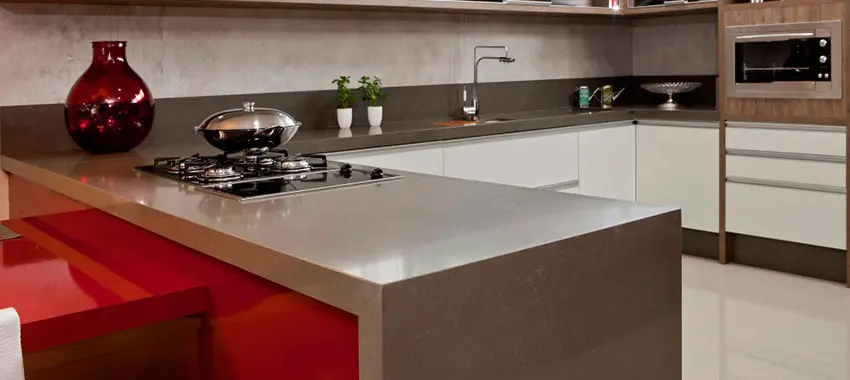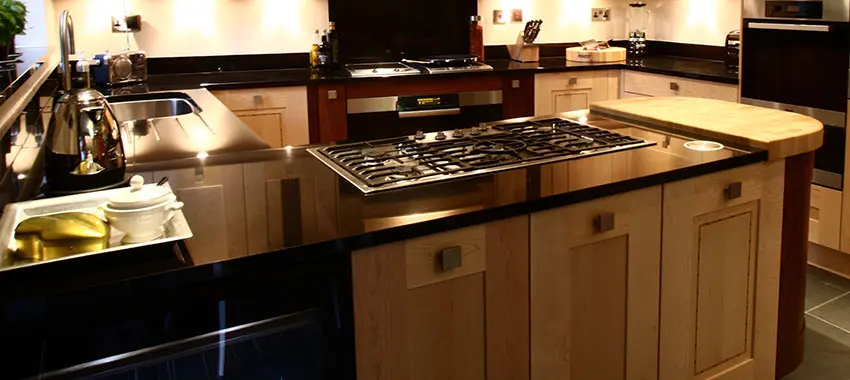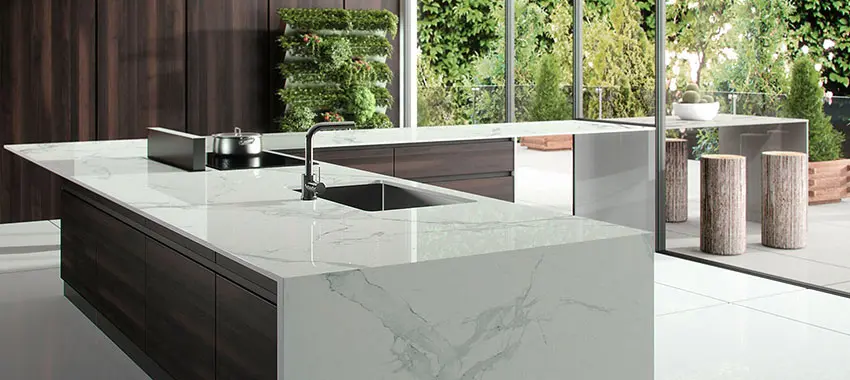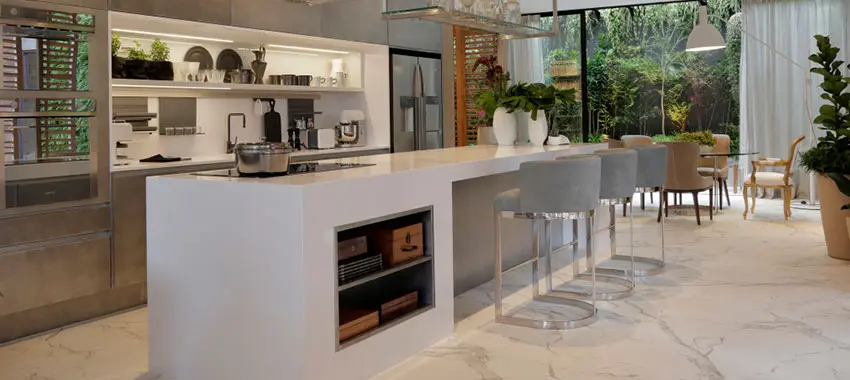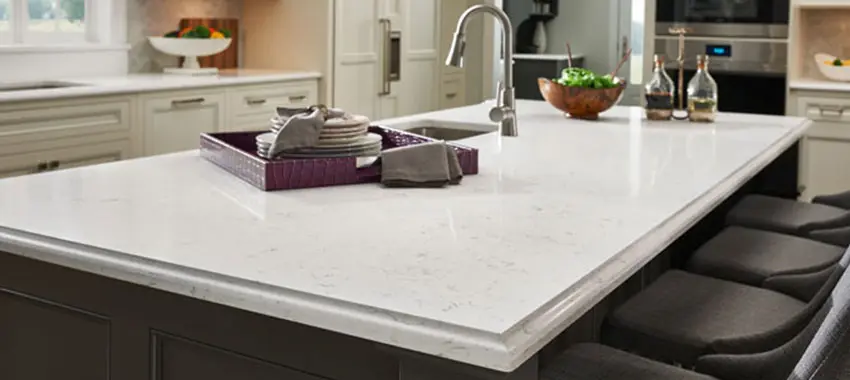Aug
Concrete Vs. Quartz Countertops: Which Option Is Better?
- 2025
- FlintStoneTops
When it comes to kitchen countertops, there are natural stones are then there are man-made materials. If you’re considering man-made materials and, that too, durable ones, then you may want to know more about two materials: quartz and concrete. So, here is a comparison between concrete and quartz countertops in case you want to choose between the two.
How To Choose Between Concrete And Quartz Countertops?
The Material
First, we will discuss the material and how it’s made. When it comes to kitchen countertops, the materials you choose are extremely crucial. The composition of the material says a lot about the durability and longevity.
Concrete Countertops
When it comes to concrete, it is literally what it sounds like. Concrete is made out of mortar and cement in a very specific combination to give the material its characteristic appearance and list of qualities.
Concrete is generally a neutral material, but when pigment is added, it can be turned into a color. Concrete, because it is made out of sand and mortar, has a very rough look, and it is very rustic-looking. So, if that is what you are looking for, then you can go for it.
Quartz Countertops
Quartz is also a man-made material and it is composed of pulverized stones and quartz crystals and then these things are bound by a clear mix of liquid, which hardens to a rock-solid finish and that is resin.
The result is a countertop that looks just like marble, but the strength is exceptional. Quartz is one of the strongest kitchen countertop materials out there and it is up there with granite and other natural stones, so you know that it is good.
Durability
Next up is the durability of the materials. When you’re choosing countertop materials, they need to be strong. You can’t just get a kitchen countertop that is very fragile, because it won’t last long in the kitchen.
Concrete Countertops
When it comes to concrete, it literally looks like rocks. It is an amazing material with sound durability. It is very strong and it doesn’t budge or crack under weight or pressure. Although concrete is very hard and it doesn’t scratch or chip easily, it is still not indestructible. It can get ruined by something harsh like wire mesh or even acids. So, that is something to keep in mind.
Quartz Countertops
The stone, quartz, is one of the strongest man-made countertop materials out there. It is chip-resistant and it doesn’t break easily, especially around the edges, which are considered to be the most fragile part of the countertops.
However, that also doesn’t mean that quartz can’t ever break. That is impossible. If you use too much force or mishandle the material, then there will obviously come a time when it won’t be able to endure anything for too long and it will break and chip.
Maintenance
The next thing to go over when it comes to kitchen countertops is the maintenance. You don’t want to choose a material that is too heavy on the maintenance side of things. Otherwise, you will be spending all of your time treating the material with kid’s gloves and that is not what you want.
Concrete Countertops
Concrete is sadly porous, which means that it can absorb water into its surface and that can cause a whole lot of damage. This is why an essential part of maintaining concrete is waterproofing it and that is possible through sealing.
It is a clear coat of liquid applied to fill in the pores of the concrete slabs. In this way, water won’t be able to get in easily and your countertops will be safe. As far as cleaning is concerned, dry cleaning is recommended every day.
Quartz Countertops
Quartz is a non-porous material by nature. Since the majority of quartz is composed of crystals and resin, the surface is essentially dense and has no pores in it.
This is why water naturally beads up on the surface of quartz and doesn’t get absorbed into the material. This is amazing, because aside from regular cleaning, you don’t need to maintain it a lot.
Scratch & Heat Resistance
Another factor that people go over when choosing the perfect countertop material for their kitchen is the scratch and heat resistance.
Concrete Countertops
Concrete is generally hard, but it is not entirely scratch-resistant. Even though concrete is amazing when it comes to resisting heat, the same can’t be said about scratches. It is quite soft and it can easily get scratched.
However, that is not too big of a problem, because removing scratches from concrete countertops is easy and doesn’t cost a lot either, since the supplies are readily available and they don’t need to be searched far and wide.
Quartz Countertops
Quartz lacks a bit in the heat resistance department and it makes up for this drawback in the scratch resistance department. Quartz, even though it is hard and durable, can get blistered really easily and that is because resin is not naturally heat-resistant.
As for scratches, you can use the roughest, most abrasive cleaning agents on the surface and quartz will not be affected in any way. So, conclusively, both materials lack in one department and excel in the other.
Cost
Concrete and quartz vary slightly in pricing and installation. Quartz is generally a tad bit more expensive than concrete, when you combine the actual cost of the material as well as installation and maintenance, so this is something you need to keep in mind.
Both materials generally cost fairly, so they’re not as expensive as exotic materials, but you still want to have a reasonable budget for them, so you are not overspending. Kitchen countertops are a necessity, but that doesn’t mean that you can splurge on them.
Environmental Impact
This is something that not a lot of people think of, but judging by the declining health of the planet with each passing day, this is something you need to consider.
Concrete Countertops
Concrete is naturally more environmentally sustainable because the materials which are used to make concrete are naturally sourced. However, some practices are very damaging to the environment, like the high temperatures under which cement is made.
The end product, concrete, is not toxic at all and it doesn’t emit any sort of harmful compound once it is installed in the kitchen. The point is, the material is very stable when it comes to environmental impact.
Quartz Countertops
Okay, so quartz is also a man-made material, but the fact that it uses resin, and a lot of it, makes it very damaging to the environment, especially when it is made. It is treated under very high temperature and pressure, and the toxins left behind are very harmful to everyone. So, that is something that is a huge thumbs down when it comes to quartz countertops.
Resin is a petroleum-based compound and if you know how they’re made, then you’ll want the production to stop all at once, because it is very damaging to the environment.
Conclusion
Concrete and quartz countertops both have their qualities and drawbacks, and now you know exactly what they are. Get in touch with a quartz countertops contractor Potomac to take a look at a variety of natural stone and engineered countertop options.


